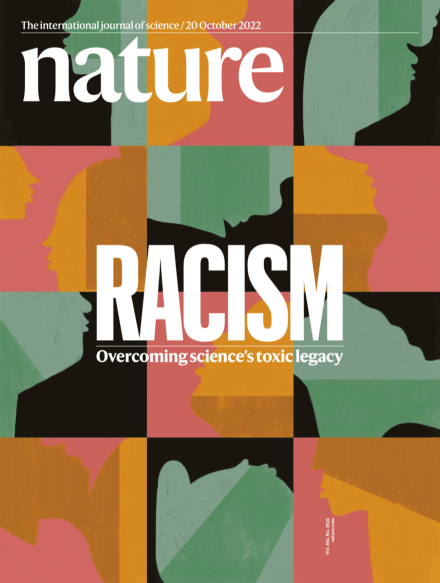Wow! Nature has played its part in creating this divisive legacy for 153-year history
Nature 發揮分裂種族主義的153 年曆史
**
Volume 610 Issue 7932, 20 October 2022
Racism
Racism casts a huge shadow on science. People of colour and from other historically marginalized groups have been excluded from the scientific enterprise, research has been used to underpin discriminatory thinking, and research outputs have ignored and further disadvantaged marginalized people. Nature has played its part in creating this divisive legacy. In this special issue – the first in the journal’s 153-year history to be overseen by guest editors — Melissa Nobles, Chad Womack, Ambroise Wonkam and Elizabeth Wathuti present articles that examine some of the ways racism has manifested in science, and the direct and detrimental effects this toxic ideology has had on individuals and their communities. By highlighting these issues, —
Cover image: Diana Ejaita
Racism in science
-
Editorial
-
Ending racism is key to better science: a message from Nature’s guest editors
This special issue is our ‘message in a bottle’ from the troubled ship of science. We urge readers to find it. Open it. Act on its contents.
- Melissa Nobles
- Chad Womack
- Elizabeth Wathuti
EditorialAdvertisement
-
Nature thanks the guest editors of our racism in science special issue
This special issue is part of Nature’s commitment to change. We thank our inspiring guest editors for helping us to make it happen.
Editorial
-
-
News Features
-
‘It’s a constant hum’: a planetary geologist calls out racism in academia
Martha Gilmore has faced not only accusations of theft and lying, but also quiet isolation and the pain of watching racism bear down on others.
- Kendra Pierre-Louis
News Feature -
The first Indigenous female surgeon in Canada is battling for health justice
Nadine Caron was appalled to hear racist views about Indigenous health from a project adviser. So she’s fighting to change perceptions.
- McKenzie Prillaman
News Feature -
The geoscientist fighting for universities to confront systemic racism
Christopher Jackson felt obligated to speak out against racism in UK institutions, but a lack of support left him disillusioned with academia.
- Tosin Thompson
News Feature -
‘There’s no space for us’: an Indigenous-health researcher battles racism in Australia
Chelsea Watego saw a message in the cold, cramped office space she was given. She decided to fight back.
- Smriti Mallapaty
News Feature -
‘I was treated as if I was dirty’: a paediatrician decries racism against African scientists
Nadia Sam-Agudu is tired of how international funders and collaborators infantilize her and her colleagues.
- Abdullahi Tsanni
News Feature -
Computer science has a racism problem: these researchers want to fix it
Black and Hispanic people face huge hurdles at technology companies and in computer-science education in the United States, with far-reaching consequences for science and all of society.
- Melba Newsome
News Feature
-
-
Comment
-
Counter the weaponization of genetics research by extremists
Geneticists must rethink how they conduct their research and how they communicate results.
- Jedidiah Carlson
- Brenna M. Henn
- Sohini Ramachandran
Comment
-
-
News & Views
-
Skin colour affects the accuracy of medical oxygen sensors
COVID-19 broadened the use of pulse oximeters for rapid blood-oxygen readings, but it also highlighted the fact that skin pigmentation alters measurements. Two groups of researchers analyse this issue, and its effects on people with dark skin.
- Matthew D. Keller
- Brandon Harrison-Smith
- Mohammed Shahriar Arefin
News & Views Forum -
The unseen Black faces of AI algorithms
An audit of commercial facial-analysis tools found that dark-skinned faces are misclassified at a much higher rate than are faces from any other group. Four years on, the study is shaping research, regulation and commercial practices.
- Abeba Birhane
News & Views
-
-
Career Feature
-
Imperialism’s long shadow: the UK universities grappling with a colonial past
Many research institutions in the United Kingdom gained prominence as the British Empire reached its zenith — bringing them a painful reckoning as they attempt to decolonize.
- Philip Ball
Career Feature
-
-
Where I Work
-
A Jamaican medicinal-plant scientist explores his African roots
Damian Cohall’s studies of traditional medicine have sprouted new ideas for diabetes treatment and cross-Atlantic collaboration.
- Czerne Reid
-
